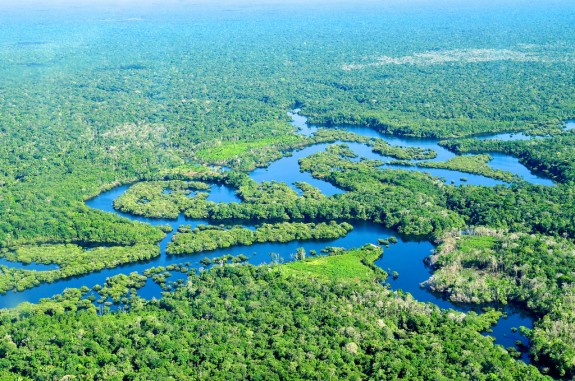The Amazon Rainforest Should Deal With Climate Change Better Than We Thought
Contrary to previous research, tropical rainforests should be able to stand up to climate change
With temperatures rising and rainfall patterns shifting with global climate change, scientists are worried what may be in store for world’s tropical rainforests, home to the richest diversity of life on the planet. But a new study by the UK Center for Ecology and Hydrology’s Chris Huntingford and colleagues found that these rainforests should actually be quite resilient to the effects of climate change—at least at the broad scale.
Based on earlier research, scientists thought that the Amazon rainforest would likely to dry out and die off as the world warms. “But in the light of new data and of improved modelling, the drying now seems a lot less probable,” says Nature.
“This has been a big issue in science for many years,” says forest ecologist Daniel Nepstad, who directs the Amazon Environmental Research Institute in San Francisco, “and the emerging view is that there is less sensitivity in tropical forests for climate-driven dieback”.
In the new study, Hungtingford and colleagues found that, in the vast majority of their simulations, the forests will actually contain more biomass—the total amount of plant life—by the end of the century. Using a range of computer models and drawing on differing assumptions of how the forest and the climate interact, the team found that in only one of these set-ups did the amount of biomass in tropical rainforests shrink. Even then it was only for those in the Americas—Africa’s and Asia’s forests stood strong. But this boost doesn’t last forever:
Forest biomass carbon stocks in Asia and Africa are projected to be greater in year 2100 than at the present day, in all simulations. This is also true for the Americas/Amazon, except for the HadCM3 climate model. There is however a decreasing ability to sequester carbon in biomass; many pathways have a Cv peak towards the end of the twenty-first century.
The scientists say that the biggest uncertainty here is whether or not they properly understand exactly how the plants will respond to rising temperatures, changing rainfall patterns and all the other consequences of climate change.
It’s important to keep in mind that the scientists found only that the total amount of biomass in the forests isn’t expected to decrease. In aggregate, the forests will remain roughly the same size, or even grow a little. This doesn’t mean, however, that the individual species that make up the current forest will not be affected or that these ecologically sensitive regions will contain the same biological diversity.
And even though the long-term effects of climate change on tropical rainforests may not be as bad as we thought, the threat of deforestation from farming, logging, mining and other practices remains a serious risk to rainforest biodiversity.
More from Smithsonian.com:
Most Arctic Animals Should Deal With Climate Change Just Fine
/https://tf-cmsv2-smithsonianmag-media.s3.amazonaws.com/accounts/headshot/smartnews-colin-schultz-240.jpg)

/https://tf-cmsv2-smithsonianmag-media.s3.amazonaws.com/accounts/headshot/smartnews-colin-schultz-240.jpg)